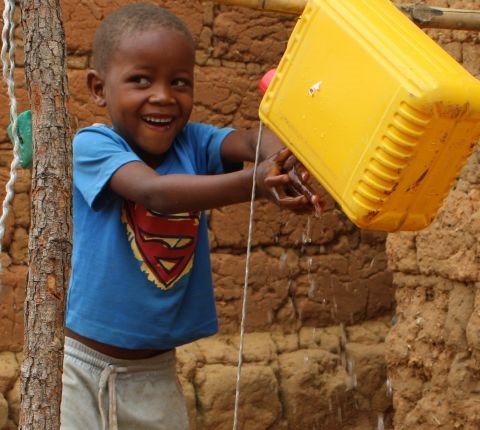Water, Hygiene and Sanitation
WVI in Angola seeks to provide access to improved water, sanitation and hygiene practices through an integrated approach that enhances access to drinking water sources in communities, provides technical assistance for the construction of improved latrines, training and awareness-raising campaigns for behavior change in relation to hygiene practices and support to communities in establishing their own management mechanisms.
What we want to do:
We want to see all children enjoy access to clean water and improved sanitation facilities close to their homes. We are working towards this by:
- Improving the water, sanitation and hygiene conditions of the most vulnerable children
- Ensuring safe and equitable access for all
- Ending Open Defecation
What is the problem?
Nearly half the population of Angola (49.3%) lacks access to clean drinking water. More than half (54.7%) of schools in Angola do not have access to adequate sanitation facilities and most (68.6%) have no hand-washing facilities on site. The situation is especially difficult for girls once they reach adolescence as only 28% of schools have adequate facilities for girls when they are menstruating.
How is World Vision addressing the issues?
We are partnering with communities to increase easy, reliable access to clean water through the drilling of new boreholes and the restoration of non-functioning water systems. And, we are working with schools and health centers to ensure children and their families have access to clean water while they are studying or at a clinic by installing water points.
WVI’s intervention in Angola is also focused on improving WASH services in both schools and health care facilities. Schools represent the best vehicle for producing rapid results, reaching a large number of children and producing a positive impact considering that children are healthier and there is an increase in the frequency in classed and improved learning. In addition, schools are the best place to promote training and awareness campaigns, with children being more receptive to behavioral changes that can be spread amongst their families.
At Community level, the WVI in Angola approach to sanitation is based on the implementation of CLTS (Community-led Total Sanitation). This approach, is the same as community that manages the process that leads to achieving the Free Community of Outdoor Defecation. WVI in Angola is starting to introduce an innovative, holistic, sustainable and environmentally sound sanitation solution, addressing the issues of dignity and quality of life in schools and health centers. The proposed technology uses the concept of dry sanitation, which is accessible and easy to manage, ensuring safe treatments and disposal of human excreta. Their separation design creates the possibility for children in school to engage in complementary gardening activities, giving better use of wastewater. The facilities can be adapted to accommodate children with disabilities and is suitable for menstrual hygiene.
What’s the impact?*
- 54,893 people (including 33,122 children) gained access to safe water through the rehabilitation of 114 water points (102 in communities, one at a health facility and 11 at schools).
- 63,594 people (including 30,187 children) now have access to improved sanitation facilities, following the construction of 6,330 latrines.
- 4,793 caregivers learned about appropriate hygiene practices.
- 72 communities were declared Open Defecation Free (ODF) benefiting 63,594 people.
- In 2018, WVI Angola's water, sanitation and hygiene actions benefited 61,266 people, including 33,886 children. These actions were funded by WVUS and the Spanish foundation Pascual.
Related Resources
- See how access to clean water is reducing the prevalence of diarrhea for children in Angola
- Learn how promoting proper sanitation and the elimination of Open Defecation is helping communities stay cleaner and children healthier in Angola
